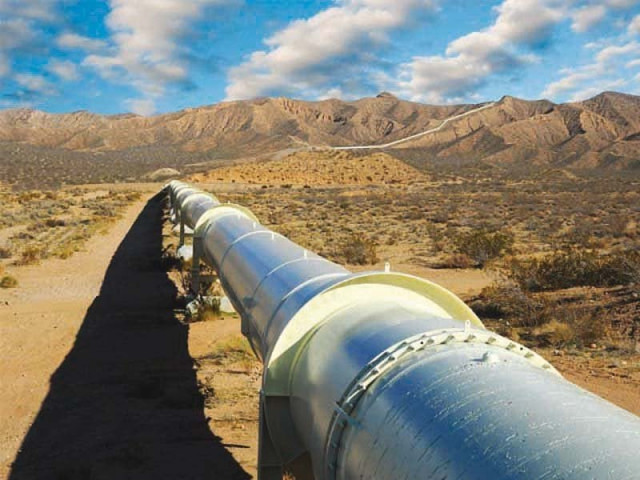Iran has not much gas for sale, Pakistan must act swiftly
European countries also eager to source energy supply from Tehran

The government needs to kick-start the IP project and persuade Iran to save the vital fuel for Pakistan, which can also earn transit fee from the pipeline that will pass through its territory to India. PHOTO: FILE
The revival of the Iran-Pakistan (IP) pipeline project and its early development seem to be the most economically justified and greatly support the national interest.
Iranian Foreign Minister Javad Zarif visited Pakistan a few days ago where he expressed the desire for an early building of the pipeline.
“We have conveyed our resolve to the Iranian foreign minister that we are committed to implementing the gas pipeline project after sanctions are lifted,” Petroleum and Natural Resources Minister Shahid Khaqan Abbasi told The Express Tribune.
Read: China-funded LNG project to turn into Iran-Pakistan gas pipeline: petroleum minister
The foreign minister stressed that economic restrictions would be removed soon following a landmark nuclear deal with global powers, he said.
At present, Pakistan mainly depends on thermal power plants that consume expensive furnace oil and high-speed diesel. Power production with the help of comparatively cheaper Iranian gas will not only lead to a reduction in the oil import bill, but will also bring down the electricity consumption cost of power consumers, who are still bearing high tariffs despite plunging oil prices.
Apart from the soaring bills, the critical energy supply and demand situation has left some of the country’s major cities without electricity for almost 12 hours a day, suggesting that the country’s electricity and gas needs are real and Iranian gas is the best available option.
Pakistan faces over 7,000-megawatt power shortfall in the peak summer season that causes blackouts in many areas and cripples life and business. Estimates suggest that the energy shortage strikes 3% off economic growth every year.
Under an agreement, Iran will supply 750 million cubic feet of gas per day (mmcfd) to Pakistan and the volume will be enough to generate 5,000MW of electricity. Later, supplies will be boosted to one billion cubic feet per day (bcfd).
With the completion of the IP pipeline, government estimates say, the country will save $1 billion in oil imports every year, taking total savings for the project’s 25-year contract period to $25 billion.
Of the gas import from Iran, Balochistan has sought 250 mmcfd for consumption at the Gwadar Port, the control of which has been handed over to a Chinese company. The government is planning to set up duty-free economic zones in the coastal city of Gwadar and Iranian gas will provide a major boost to economic activities there.
In addition to electricity shortages, the country endures gas scarcity that reaches its peak in winter when even domestic consumers are left scrambling for the vital heating and cooking fuel.
Read: Too soon for 'illogical' US to return to Tehran: Iran
According to a government study, gas production will plunge from 4 to 2 bcfd in 2020, which underlines the need of immediate gas purchase from Iran.
Right decision
The Iranian gas can satisfy more than 40% of Pakistan’s appetite for energy and this will automatically spark industrial development, end electricity outages and significantly increase Pakistan’s credit rating. But the government should swiftly act and make a right decision because Tehran right now has not much gas for sale as exploration activities had screeched to a halt in the wake of international sanctions.
The United States is engaged in intense lobbying in the European Union to persuade the 28-nation bloc to meet its energy needs through Iran and rely less on Russia.
Iran is already providing gas to Turkey and is also enthusiastic about gas export to Europe in the next five to ten years. European nations are willing to stop buying Russian gas and in this case they will definitely try to source supplies from Iran.
At the same time, Pakistan cannot afford to invest in the exploration of fresh hydrocarbon deposits given the huge capital injection and long time needed.
The government needs to kick-start the IP project and persuade Iran to save the vital fuel for Pakistan, which can also earn transit fee from the pipeline that will pass through its territory to India, which is likely to join the project. India had earlier pulled out following a civil nuclear energy agreement with the US.
Pakistan should push for a regional energy pact involving Iranian gas and also keep in view its national interest. However, the US will continue to pile on the pressure because the IP pipeline is considered a big threat to its interests in the region.
The writer is a staff correspondent
Published in The Express Tribune, August 24th, 2015.
Like Business on Facebook, follow @TribuneBiz on Twitter to stay informed and join in the conversation.



















COMMENTS
Comments are moderated and generally will be posted if they are on-topic and not abusive.
For more information, please see our Comments FAQ